Analyzing Hearsay Evidence, Article 6, and the Human Rights Act 1998
VerifiedAdded on 2023/06/09
|9
|2495
|437
Essay
AI Summary
This essay examines the law of hearsay in the context of the Criminal Justice Act 2003 and the Human Rights Act 1998, focusing on the 'sole and decisive rule' and its compatibility with European jurisprudence. It discusses the admissibility of hearsay evidence, particularly statements made outside court proceedings and situations involving absent witnesses, while considering potential breaches of Article 6 of the European Convention on Human Rights. The analysis incorporates case law, including R v Horncastle and Al-Khawaja v. the United Kingdom, to illustrate the complexities of balancing the use of hearsay evidence with the right to a fair trial. The essay concludes by emphasizing the court's discretion in admitting hearsay evidence, considering factors such as witness unavailability and the need to ensure justice, while upholding fundamental rights.
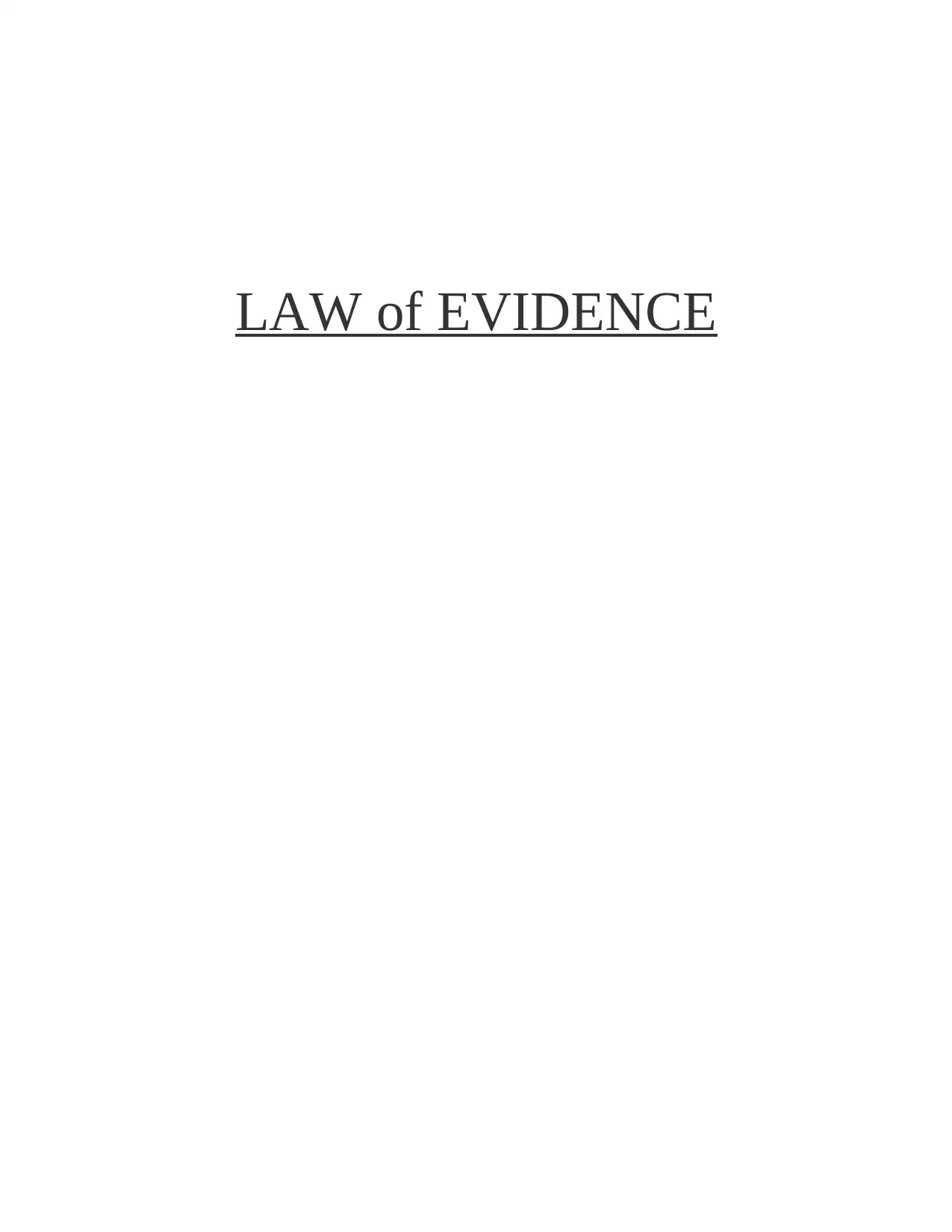
LAW of EVIDENCE
Paraphrase This Document
Need a fresh take? Get an instant paraphrase of this document with our AI Paraphraser
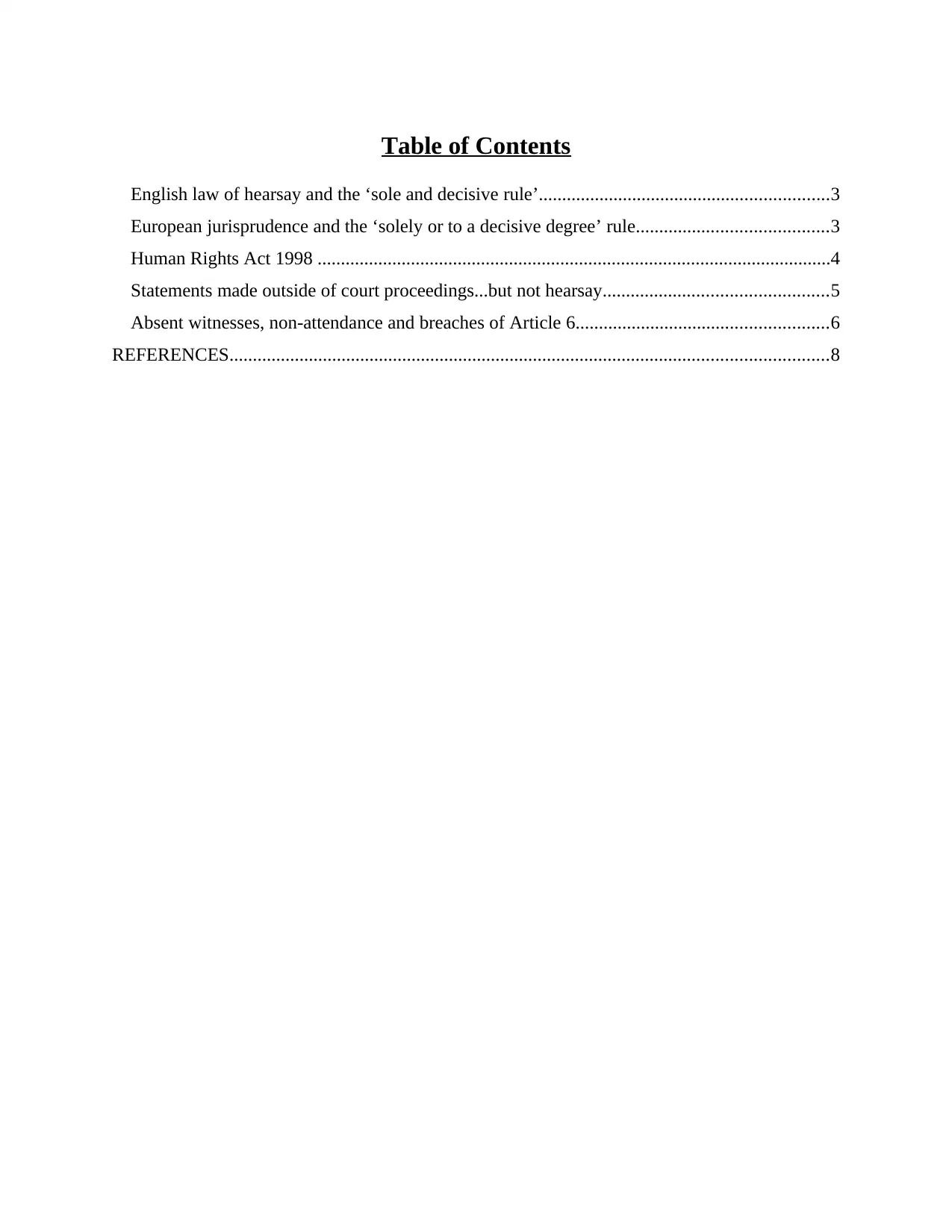
Table of Contents
English law of hearsay and the ‘sole and decisive rule’..............................................................3
European jurisprudence and the ‘solely or to a decisive degree’ rule.........................................3
Human Rights Act 1998 ..............................................................................................................4
Statements made outside of court proceedings...but not hearsay................................................5
Absent witnesses, non-attendance and breaches of Article 6......................................................6
REFERENCES................................................................................................................................8
English law of hearsay and the ‘sole and decisive rule’..............................................................3
European jurisprudence and the ‘solely or to a decisive degree’ rule.........................................3
Human Rights Act 1998 ..............................................................................................................4
Statements made outside of court proceedings...but not hearsay................................................5
Absent witnesses, non-attendance and breaches of Article 6......................................................6
REFERENCES................................................................................................................................8
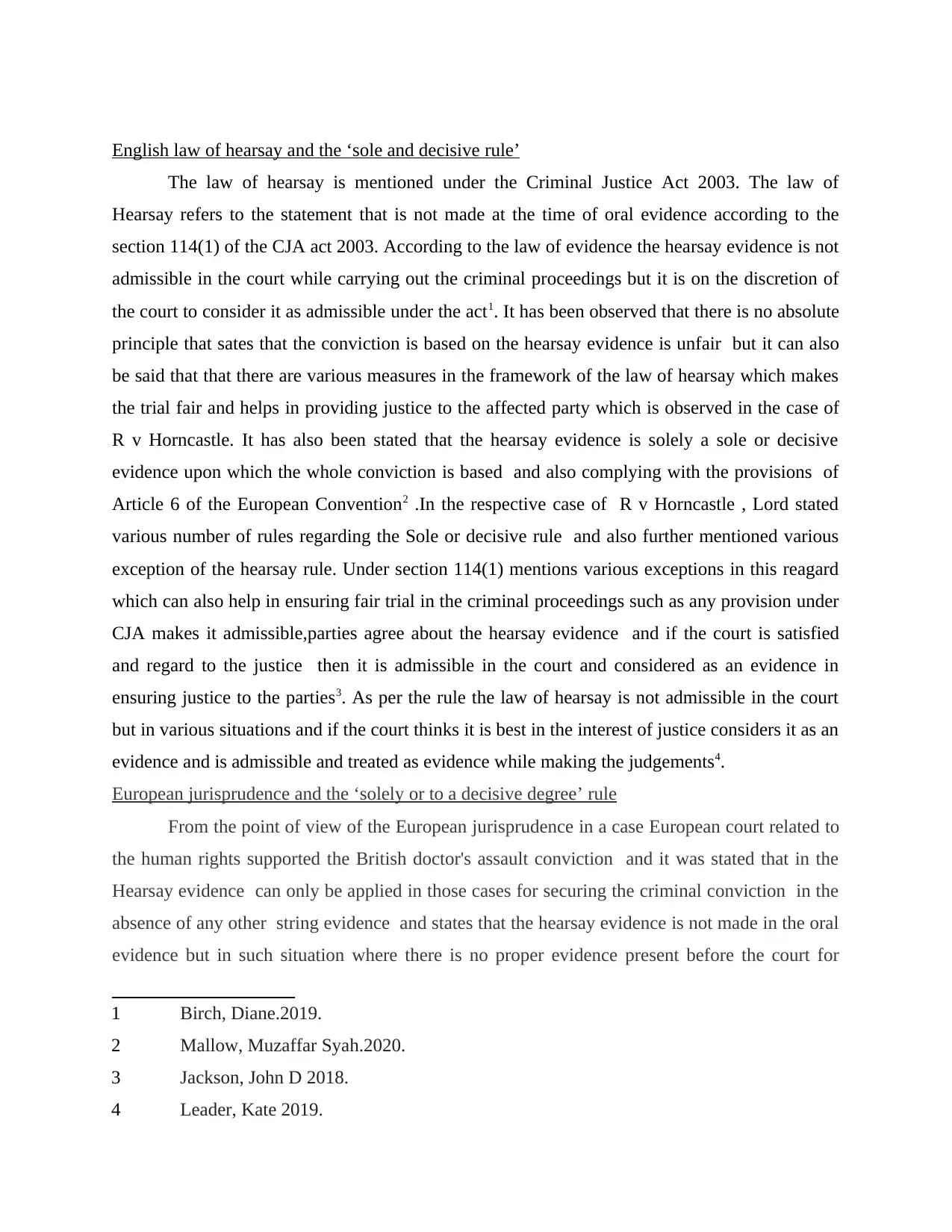
English law of hearsay and the ‘sole and decisive rule’
The law of hearsay is mentioned under the Criminal Justice Act 2003. The law of
Hearsay refers to the statement that is not made at the time of oral evidence according to the
section 114(1) of the CJA act 2003. According to the law of evidence the hearsay evidence is not
admissible in the court while carrying out the criminal proceedings but it is on the discretion of
the court to consider it as admissible under the act1. It has been observed that there is no absolute
principle that sates that the conviction is based on the hearsay evidence is unfair but it can also
be said that that there are various measures in the framework of the law of hearsay which makes
the trial fair and helps in providing justice to the affected party which is observed in the case of
R v Horncastle. It has also been stated that the hearsay evidence is solely a sole or decisive
evidence upon which the whole conviction is based and also complying with the provisions of
Article 6 of the European Convention2 .In the respective case of R v Horncastle , Lord stated
various number of rules regarding the Sole or decisive rule and also further mentioned various
exception of the hearsay rule. Under section 114(1) mentions various exceptions in this reagard
which can also help in ensuring fair trial in the criminal proceedings such as any provision under
CJA makes it admissible,parties agree about the hearsay evidence and if the court is satisfied
and regard to the justice then it is admissible in the court and considered as an evidence in
ensuring justice to the parties3. As per the rule the law of hearsay is not admissible in the court
but in various situations and if the court thinks it is best in the interest of justice considers it as an
evidence and is admissible and treated as evidence while making the judgements4.
European jurisprudence and the ‘solely or to a decisive degree’ rule
From the point of view of the European jurisprudence in a case European court related to
the human rights supported the British doctor's assault conviction and it was stated that in the
Hearsay evidence can only be applied in those cases for securing the criminal conviction in the
absence of any other string evidence and states that the hearsay evidence is not made in the oral
evidence but in such situation where there is no proper evidence present before the court for
1 Birch, Diane.2019.
2 Mallow, Muzaffar Syah.2020.
3 Jackson, John D 2018.
4 Leader, Kate 2019.
The law of hearsay is mentioned under the Criminal Justice Act 2003. The law of
Hearsay refers to the statement that is not made at the time of oral evidence according to the
section 114(1) of the CJA act 2003. According to the law of evidence the hearsay evidence is not
admissible in the court while carrying out the criminal proceedings but it is on the discretion of
the court to consider it as admissible under the act1. It has been observed that there is no absolute
principle that sates that the conviction is based on the hearsay evidence is unfair but it can also
be said that that there are various measures in the framework of the law of hearsay which makes
the trial fair and helps in providing justice to the affected party which is observed in the case of
R v Horncastle. It has also been stated that the hearsay evidence is solely a sole or decisive
evidence upon which the whole conviction is based and also complying with the provisions of
Article 6 of the European Convention2 .In the respective case of R v Horncastle , Lord stated
various number of rules regarding the Sole or decisive rule and also further mentioned various
exception of the hearsay rule. Under section 114(1) mentions various exceptions in this reagard
which can also help in ensuring fair trial in the criminal proceedings such as any provision under
CJA makes it admissible,parties agree about the hearsay evidence and if the court is satisfied
and regard to the justice then it is admissible in the court and considered as an evidence in
ensuring justice to the parties3. As per the rule the law of hearsay is not admissible in the court
but in various situations and if the court thinks it is best in the interest of justice considers it as an
evidence and is admissible and treated as evidence while making the judgements4.
European jurisprudence and the ‘solely or to a decisive degree’ rule
From the point of view of the European jurisprudence in a case European court related to
the human rights supported the British doctor's assault conviction and it was stated that in the
Hearsay evidence can only be applied in those cases for securing the criminal conviction in the
absence of any other string evidence and states that the hearsay evidence is not made in the oral
evidence but in such situation where there is no proper evidence present before the court for
1 Birch, Diane.2019.
2 Mallow, Muzaffar Syah.2020.
3 Jackson, John D 2018.
4 Leader, Kate 2019.
⊘ This is a preview!⊘
Do you want full access?
Subscribe today to unlock all pages.

Trusted by 1+ million students worldwide
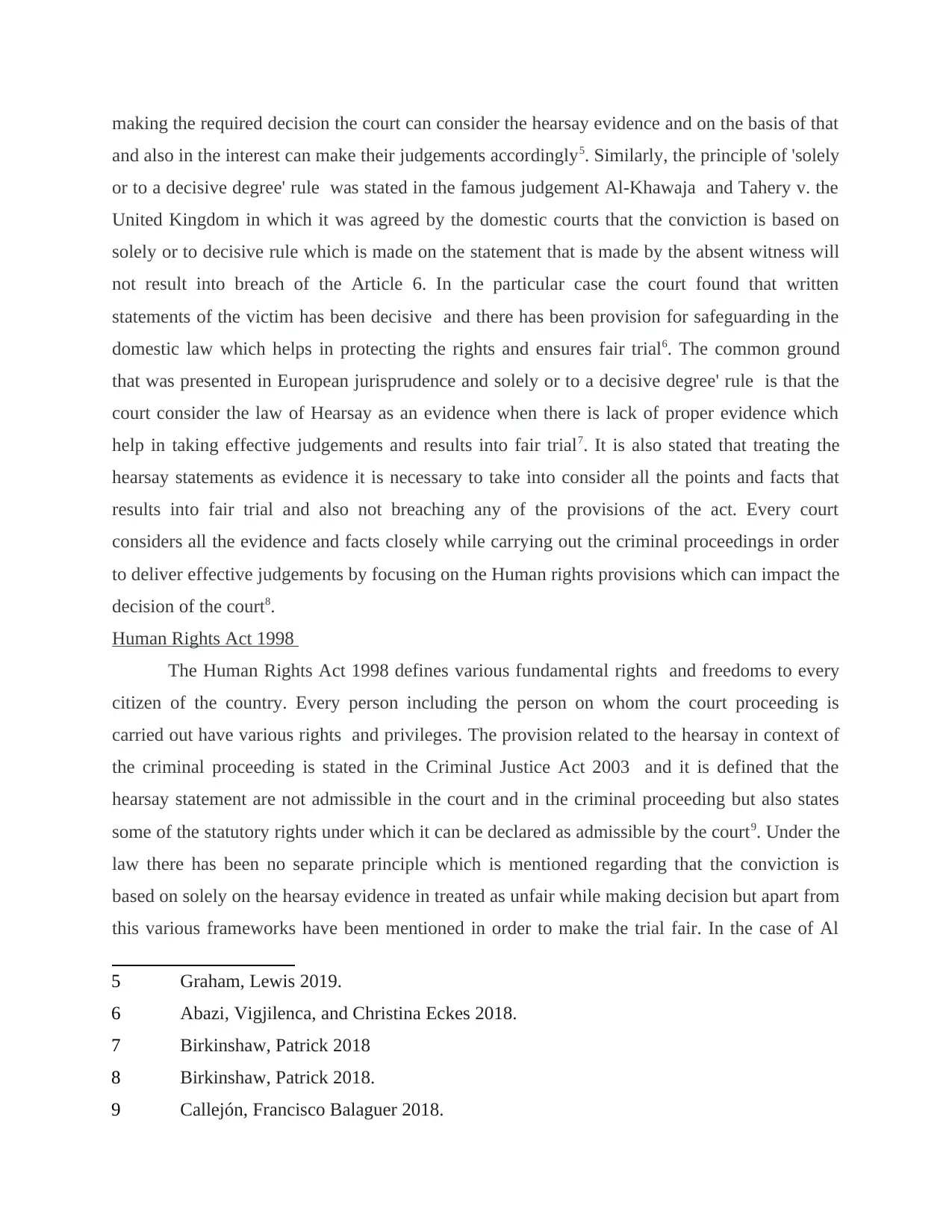
making the required decision the court can consider the hearsay evidence and on the basis of that
and also in the interest can make their judgements accordingly5. Similarly, the principle of 'solely
or to a decisive degree' rule was stated in the famous judgement Al-Khawaja and Tahery v. the
United Kingdom in which it was agreed by the domestic courts that the conviction is based on
solely or to decisive rule which is made on the statement that is made by the absent witness will
not result into breach of the Article 6. In the particular case the court found that written
statements of the victim has been decisive and there has been provision for safeguarding in the
domestic law which helps in protecting the rights and ensures fair trial6. The common ground
that was presented in European jurisprudence and solely or to a decisive degree' rule is that the
court consider the law of Hearsay as an evidence when there is lack of proper evidence which
help in taking effective judgements and results into fair trial7. It is also stated that treating the
hearsay statements as evidence it is necessary to take into consider all the points and facts that
results into fair trial and also not breaching any of the provisions of the act. Every court
considers all the evidence and facts closely while carrying out the criminal proceedings in order
to deliver effective judgements by focusing on the Human rights provisions which can impact the
decision of the court8.
Human Rights Act 1998
The Human Rights Act 1998 defines various fundamental rights and freedoms to every
citizen of the country. Every person including the person on whom the court proceeding is
carried out have various rights and privileges. The provision related to the hearsay in context of
the criminal proceeding is stated in the Criminal Justice Act 2003 and it is defined that the
hearsay statement are not admissible in the court and in the criminal proceeding but also states
some of the statutory rights under which it can be declared as admissible by the court9. Under the
law there has been no separate principle which is mentioned regarding that the conviction is
based on solely on the hearsay evidence in treated as unfair while making decision but apart from
this various frameworks have been mentioned in order to make the trial fair. In the case of Al
5 Graham, Lewis 2019.
6 Abazi, Vigjilenca, and Christina Eckes 2018.
7 Birkinshaw, Patrick 2018
8 Birkinshaw, Patrick 2018.
9 Callejón, Francisco Balaguer 2018.
and also in the interest can make their judgements accordingly5. Similarly, the principle of 'solely
or to a decisive degree' rule was stated in the famous judgement Al-Khawaja and Tahery v. the
United Kingdom in which it was agreed by the domestic courts that the conviction is based on
solely or to decisive rule which is made on the statement that is made by the absent witness will
not result into breach of the Article 6. In the particular case the court found that written
statements of the victim has been decisive and there has been provision for safeguarding in the
domestic law which helps in protecting the rights and ensures fair trial6. The common ground
that was presented in European jurisprudence and solely or to a decisive degree' rule is that the
court consider the law of Hearsay as an evidence when there is lack of proper evidence which
help in taking effective judgements and results into fair trial7. It is also stated that treating the
hearsay statements as evidence it is necessary to take into consider all the points and facts that
results into fair trial and also not breaching any of the provisions of the act. Every court
considers all the evidence and facts closely while carrying out the criminal proceedings in order
to deliver effective judgements by focusing on the Human rights provisions which can impact the
decision of the court8.
Human Rights Act 1998
The Human Rights Act 1998 defines various fundamental rights and freedoms to every
citizen of the country. Every person including the person on whom the court proceeding is
carried out have various rights and privileges. The provision related to the hearsay in context of
the criminal proceeding is stated in the Criminal Justice Act 2003 and it is defined that the
hearsay statement are not admissible in the court and in the criminal proceeding but also states
some of the statutory rights under which it can be declared as admissible by the court9. Under the
law there has been no separate principle which is mentioned regarding that the conviction is
based on solely on the hearsay evidence in treated as unfair while making decision but apart from
this various frameworks have been mentioned in order to make the trial fair. In the case of Al
5 Graham, Lewis 2019.
6 Abazi, Vigjilenca, and Christina Eckes 2018.
7 Birkinshaw, Patrick 2018
8 Birkinshaw, Patrick 2018.
9 Callejón, Francisco Balaguer 2018.
Paraphrase This Document
Need a fresh take? Get an instant paraphrase of this document with our AI Paraphraser
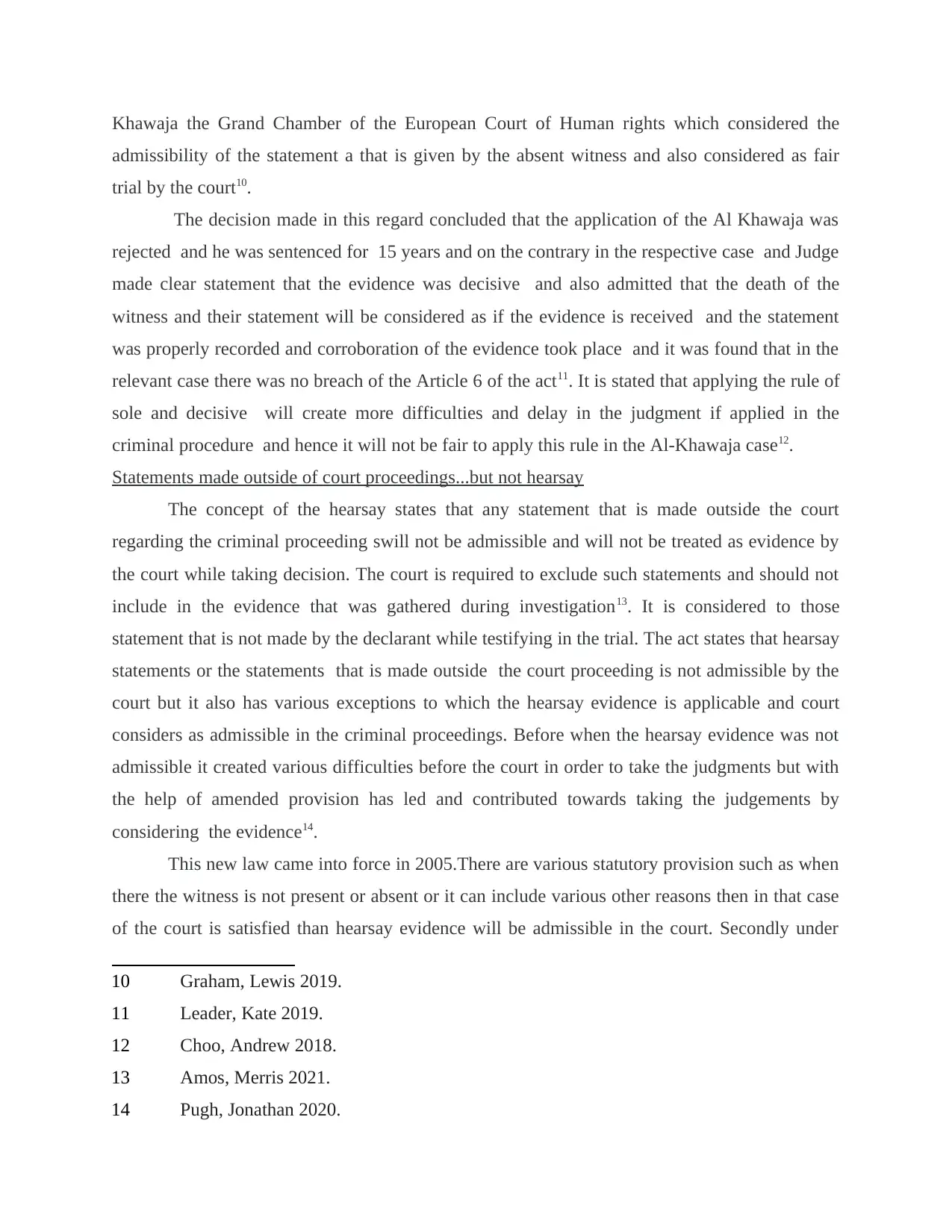
Khawaja the Grand Chamber of the European Court of Human rights which considered the
admissibility of the statement a that is given by the absent witness and also considered as fair
trial by the court10.
The decision made in this regard concluded that the application of the Al Khawaja was
rejected and he was sentenced for 15 years and on the contrary in the respective case and Judge
made clear statement that the evidence was decisive and also admitted that the death of the
witness and their statement will be considered as if the evidence is received and the statement
was properly recorded and corroboration of the evidence took place and it was found that in the
relevant case there was no breach of the Article 6 of the act11. It is stated that applying the rule of
sole and decisive will create more difficulties and delay in the judgment if applied in the
criminal procedure and hence it will not be fair to apply this rule in the Al-Khawaja case12.
Statements made outside of court proceedings...but not hearsay
The concept of the hearsay states that any statement that is made outside the court
regarding the criminal proceeding swill not be admissible and will not be treated as evidence by
the court while taking decision. The court is required to exclude such statements and should not
include in the evidence that was gathered during investigation13. It is considered to those
statement that is not made by the declarant while testifying in the trial. The act states that hearsay
statements or the statements that is made outside the court proceeding is not admissible by the
court but it also has various exceptions to which the hearsay evidence is applicable and court
considers as admissible in the criminal proceedings. Before when the hearsay evidence was not
admissible it created various difficulties before the court in order to take the judgments but with
the help of amended provision has led and contributed towards taking the judgements by
considering the evidence14.
This new law came into force in 2005.There are various statutory provision such as when
there the witness is not present or absent or it can include various other reasons then in that case
of the court is satisfied than hearsay evidence will be admissible in the court. Secondly under
10 Graham, Lewis 2019.
11 Leader, Kate 2019.
12 Choo, Andrew 2018.
13 Amos, Merris 2021.
14 Pugh, Jonathan 2020.
admissibility of the statement a that is given by the absent witness and also considered as fair
trial by the court10.
The decision made in this regard concluded that the application of the Al Khawaja was
rejected and he was sentenced for 15 years and on the contrary in the respective case and Judge
made clear statement that the evidence was decisive and also admitted that the death of the
witness and their statement will be considered as if the evidence is received and the statement
was properly recorded and corroboration of the evidence took place and it was found that in the
relevant case there was no breach of the Article 6 of the act11. It is stated that applying the rule of
sole and decisive will create more difficulties and delay in the judgment if applied in the
criminal procedure and hence it will not be fair to apply this rule in the Al-Khawaja case12.
Statements made outside of court proceedings...but not hearsay
The concept of the hearsay states that any statement that is made outside the court
regarding the criminal proceeding swill not be admissible and will not be treated as evidence by
the court while taking decision. The court is required to exclude such statements and should not
include in the evidence that was gathered during investigation13. It is considered to those
statement that is not made by the declarant while testifying in the trial. The act states that hearsay
statements or the statements that is made outside the court proceeding is not admissible by the
court but it also has various exceptions to which the hearsay evidence is applicable and court
considers as admissible in the criminal proceedings. Before when the hearsay evidence was not
admissible it created various difficulties before the court in order to take the judgments but with
the help of amended provision has led and contributed towards taking the judgements by
considering the evidence14.
This new law came into force in 2005.There are various statutory provision such as when
there the witness is not present or absent or it can include various other reasons then in that case
of the court is satisfied than hearsay evidence will be admissible in the court. Secondly under
10 Graham, Lewis 2019.
11 Leader, Kate 2019.
12 Choo, Andrew 2018.
13 Amos, Merris 2021.
14 Pugh, Jonathan 2020.
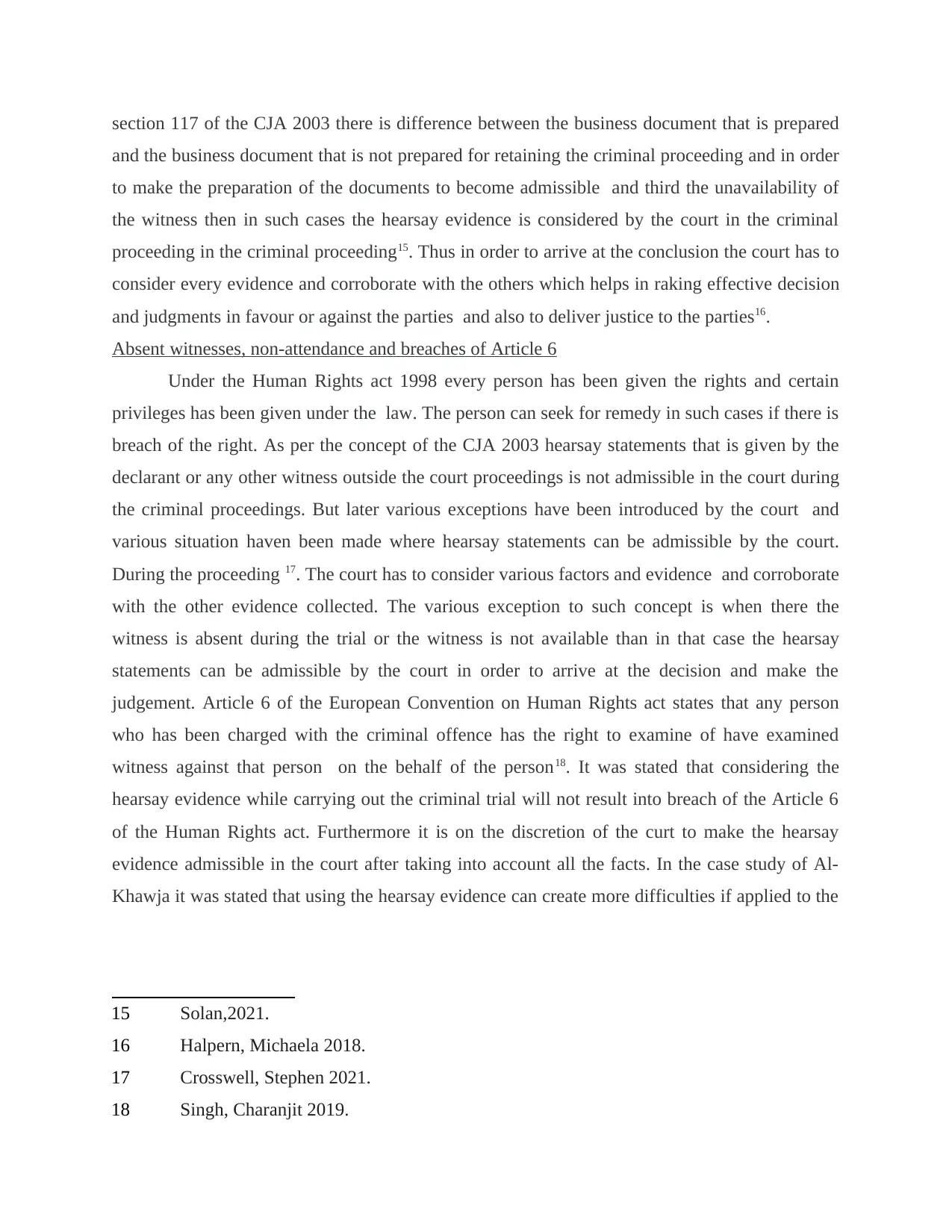
section 117 of the CJA 2003 there is difference between the business document that is prepared
and the business document that is not prepared for retaining the criminal proceeding and in order
to make the preparation of the documents to become admissible and third the unavailability of
the witness then in such cases the hearsay evidence is considered by the court in the criminal
proceeding in the criminal proceeding15. Thus in order to arrive at the conclusion the court has to
consider every evidence and corroborate with the others which helps in raking effective decision
and judgments in favour or against the parties and also to deliver justice to the parties16.
Absent witnesses, non-attendance and breaches of Article 6
Under the Human Rights act 1998 every person has been given the rights and certain
privileges has been given under the law. The person can seek for remedy in such cases if there is
breach of the right. As per the concept of the CJA 2003 hearsay statements that is given by the
declarant or any other witness outside the court proceedings is not admissible in the court during
the criminal proceedings. But later various exceptions have been introduced by the court and
various situation haven been made where hearsay statements can be admissible by the court.
During the proceeding 17. The court has to consider various factors and evidence and corroborate
with the other evidence collected. The various exception to such concept is when there the
witness is absent during the trial or the witness is not available than in that case the hearsay
statements can be admissible by the court in order to arrive at the decision and make the
judgement. Article 6 of the European Convention on Human Rights act states that any person
who has been charged with the criminal offence has the right to examine of have examined
witness against that person on the behalf of the person18. It was stated that considering the
hearsay evidence while carrying out the criminal trial will not result into breach of the Article 6
of the Human Rights act. Furthermore it is on the discretion of the curt to make the hearsay
evidence admissible in the court after taking into account all the facts. In the case study of Al-
Khawja it was stated that using the hearsay evidence can create more difficulties if applied to the
15 Solan,2021.
16 Halpern, Michaela 2018.
17 Crosswell, Stephen 2021.
18 Singh, Charanjit 2019.
and the business document that is not prepared for retaining the criminal proceeding and in order
to make the preparation of the documents to become admissible and third the unavailability of
the witness then in such cases the hearsay evidence is considered by the court in the criminal
proceeding in the criminal proceeding15. Thus in order to arrive at the conclusion the court has to
consider every evidence and corroborate with the others which helps in raking effective decision
and judgments in favour or against the parties and also to deliver justice to the parties16.
Absent witnesses, non-attendance and breaches of Article 6
Under the Human Rights act 1998 every person has been given the rights and certain
privileges has been given under the law. The person can seek for remedy in such cases if there is
breach of the right. As per the concept of the CJA 2003 hearsay statements that is given by the
declarant or any other witness outside the court proceedings is not admissible in the court during
the criminal proceedings. But later various exceptions have been introduced by the court and
various situation haven been made where hearsay statements can be admissible by the court.
During the proceeding 17. The court has to consider various factors and evidence and corroborate
with the other evidence collected. The various exception to such concept is when there the
witness is absent during the trial or the witness is not available than in that case the hearsay
statements can be admissible by the court in order to arrive at the decision and make the
judgement. Article 6 of the European Convention on Human Rights act states that any person
who has been charged with the criminal offence has the right to examine of have examined
witness against that person on the behalf of the person18. It was stated that considering the
hearsay evidence while carrying out the criminal trial will not result into breach of the Article 6
of the Human Rights act. Furthermore it is on the discretion of the curt to make the hearsay
evidence admissible in the court after taking into account all the facts. In the case study of Al-
Khawja it was stated that using the hearsay evidence can create more difficulties if applied to the
15 Solan,2021.
16 Halpern, Michaela 2018.
17 Crosswell, Stephen 2021.
18 Singh, Charanjit 2019.
⊘ This is a preview!⊘
Do you want full access?
Subscribe today to unlock all pages.

Trusted by 1+ million students worldwide
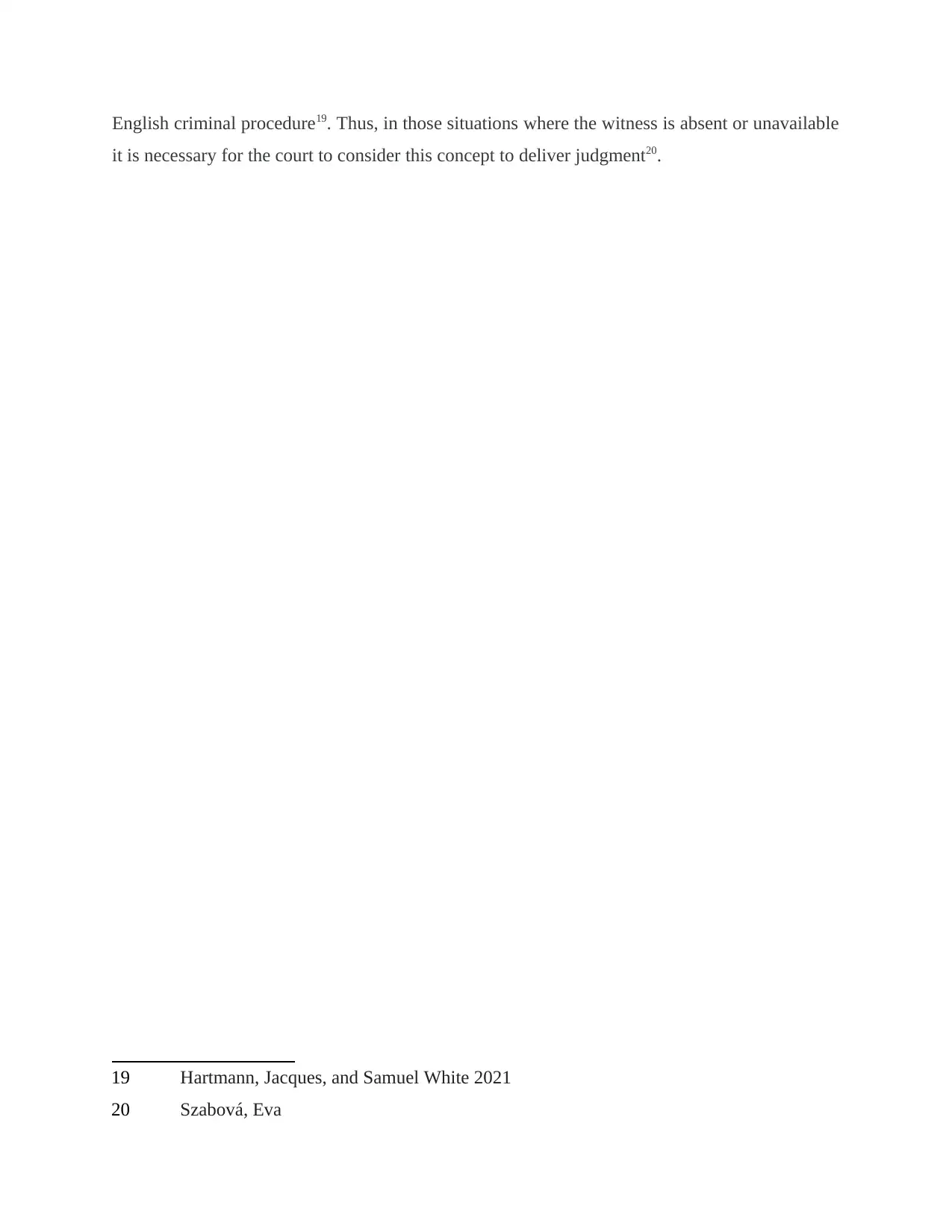
English criminal procedure19. Thus, in those situations where the witness is absent or unavailable
it is necessary for the court to consider this concept to deliver judgment20.
19 Hartmann, Jacques, and Samuel White 2021
20 Szabová, Eva
it is necessary for the court to consider this concept to deliver judgment20.
19 Hartmann, Jacques, and Samuel White 2021
20 Szabová, Eva
Paraphrase This Document
Need a fresh take? Get an instant paraphrase of this document with our AI Paraphraser
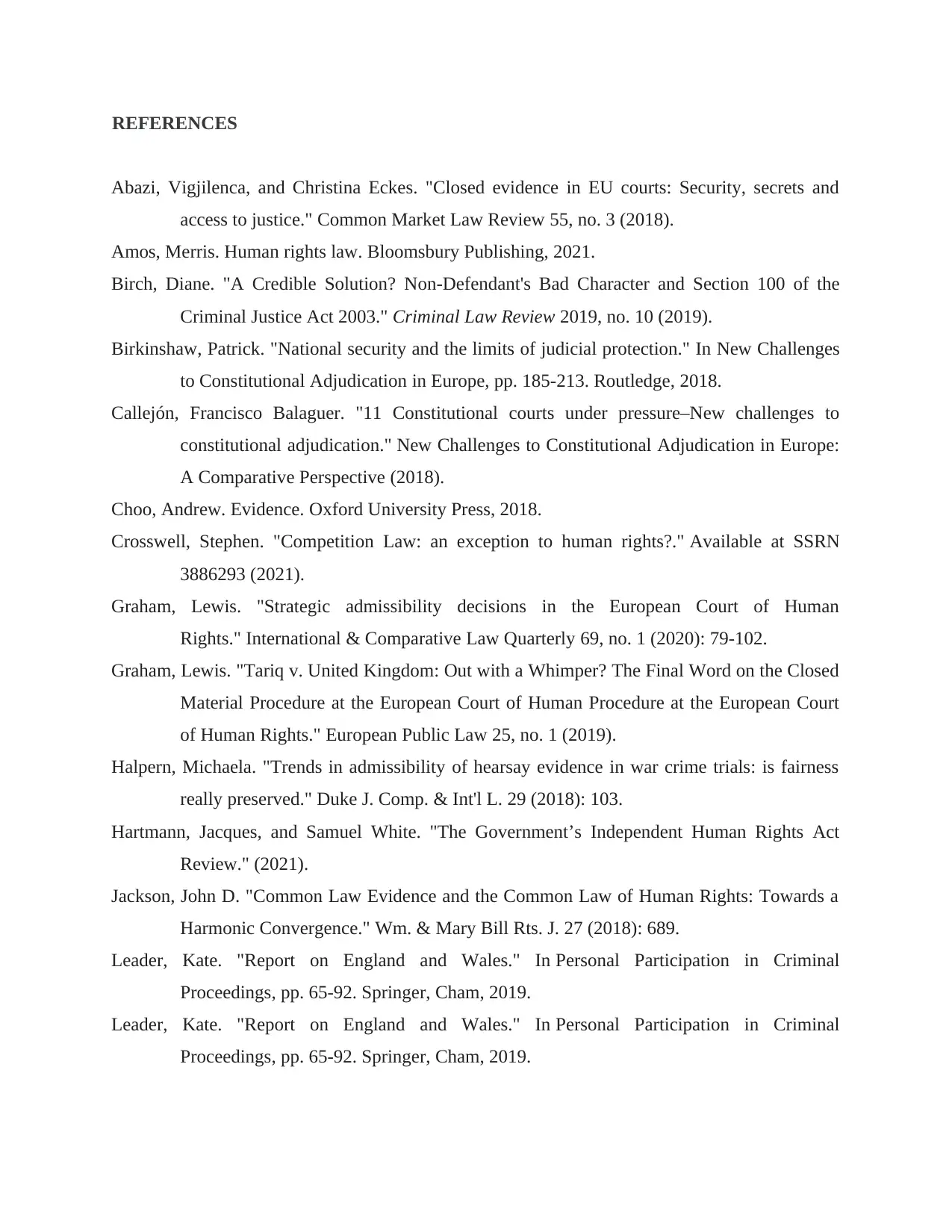
REFERENCES
Abazi, Vigjilenca, and Christina Eckes. "Closed evidence in EU courts: Security, secrets and
access to justice." Common Market Law Review 55, no. 3 (2018).
Amos, Merris. Human rights law. Bloomsbury Publishing, 2021.
Birch, Diane. "A Credible Solution? Non-Defendant's Bad Character and Section 100 of the
Criminal Justice Act 2003." Criminal Law Review 2019, no. 10 (2019).
Birkinshaw, Patrick. "National security and the limits of judicial protection." In New Challenges
to Constitutional Adjudication in Europe, pp. 185-213. Routledge, 2018.
Callejón, Francisco Balaguer. "11 Constitutional courts under pressure–New challenges to
constitutional adjudication." New Challenges to Constitutional Adjudication in Europe:
A Comparative Perspective (2018).
Choo, Andrew. Evidence. Oxford University Press, 2018.
Crosswell, Stephen. "Competition Law: an exception to human rights?." Available at SSRN
3886293 (2021).
Graham, Lewis. "Strategic admissibility decisions in the European Court of Human
Rights." International & Comparative Law Quarterly 69, no. 1 (2020): 79-102.
Graham, Lewis. "Tariq v. United Kingdom: Out with a Whimper? The Final Word on the Closed
Material Procedure at the European Court of Human Procedure at the European Court
of Human Rights." European Public Law 25, no. 1 (2019).
Halpern, Michaela. "Trends in admissibility of hearsay evidence in war crime trials: is fairness
really preserved." Duke J. Comp. & Int'l L. 29 (2018): 103.
Hartmann, Jacques, and Samuel White. "The Government’s Independent Human Rights Act
Review." (2021).
Jackson, John D. "Common Law Evidence and the Common Law of Human Rights: Towards a
Harmonic Convergence." Wm. & Mary Bill Rts. J. 27 (2018): 689.
Leader, Kate. "Report on England and Wales." In Personal Participation in Criminal
Proceedings, pp. 65-92. Springer, Cham, 2019.
Leader, Kate. "Report on England and Wales." In Personal Participation in Criminal
Proceedings, pp. 65-92. Springer, Cham, 2019.
Abazi, Vigjilenca, and Christina Eckes. "Closed evidence in EU courts: Security, secrets and
access to justice." Common Market Law Review 55, no. 3 (2018).
Amos, Merris. Human rights law. Bloomsbury Publishing, 2021.
Birch, Diane. "A Credible Solution? Non-Defendant's Bad Character and Section 100 of the
Criminal Justice Act 2003." Criminal Law Review 2019, no. 10 (2019).
Birkinshaw, Patrick. "National security and the limits of judicial protection." In New Challenges
to Constitutional Adjudication in Europe, pp. 185-213. Routledge, 2018.
Callejón, Francisco Balaguer. "11 Constitutional courts under pressure–New challenges to
constitutional adjudication." New Challenges to Constitutional Adjudication in Europe:
A Comparative Perspective (2018).
Choo, Andrew. Evidence. Oxford University Press, 2018.
Crosswell, Stephen. "Competition Law: an exception to human rights?." Available at SSRN
3886293 (2021).
Graham, Lewis. "Strategic admissibility decisions in the European Court of Human
Rights." International & Comparative Law Quarterly 69, no. 1 (2020): 79-102.
Graham, Lewis. "Tariq v. United Kingdom: Out with a Whimper? The Final Word on the Closed
Material Procedure at the European Court of Human Procedure at the European Court
of Human Rights." European Public Law 25, no. 1 (2019).
Halpern, Michaela. "Trends in admissibility of hearsay evidence in war crime trials: is fairness
really preserved." Duke J. Comp. & Int'l L. 29 (2018): 103.
Hartmann, Jacques, and Samuel White. "The Government’s Independent Human Rights Act
Review." (2021).
Jackson, John D. "Common Law Evidence and the Common Law of Human Rights: Towards a
Harmonic Convergence." Wm. & Mary Bill Rts. J. 27 (2018): 689.
Leader, Kate. "Report on England and Wales." In Personal Participation in Criminal
Proceedings, pp. 65-92. Springer, Cham, 2019.
Leader, Kate. "Report on England and Wales." In Personal Participation in Criminal
Proceedings, pp. 65-92. Springer, Cham, 2019.
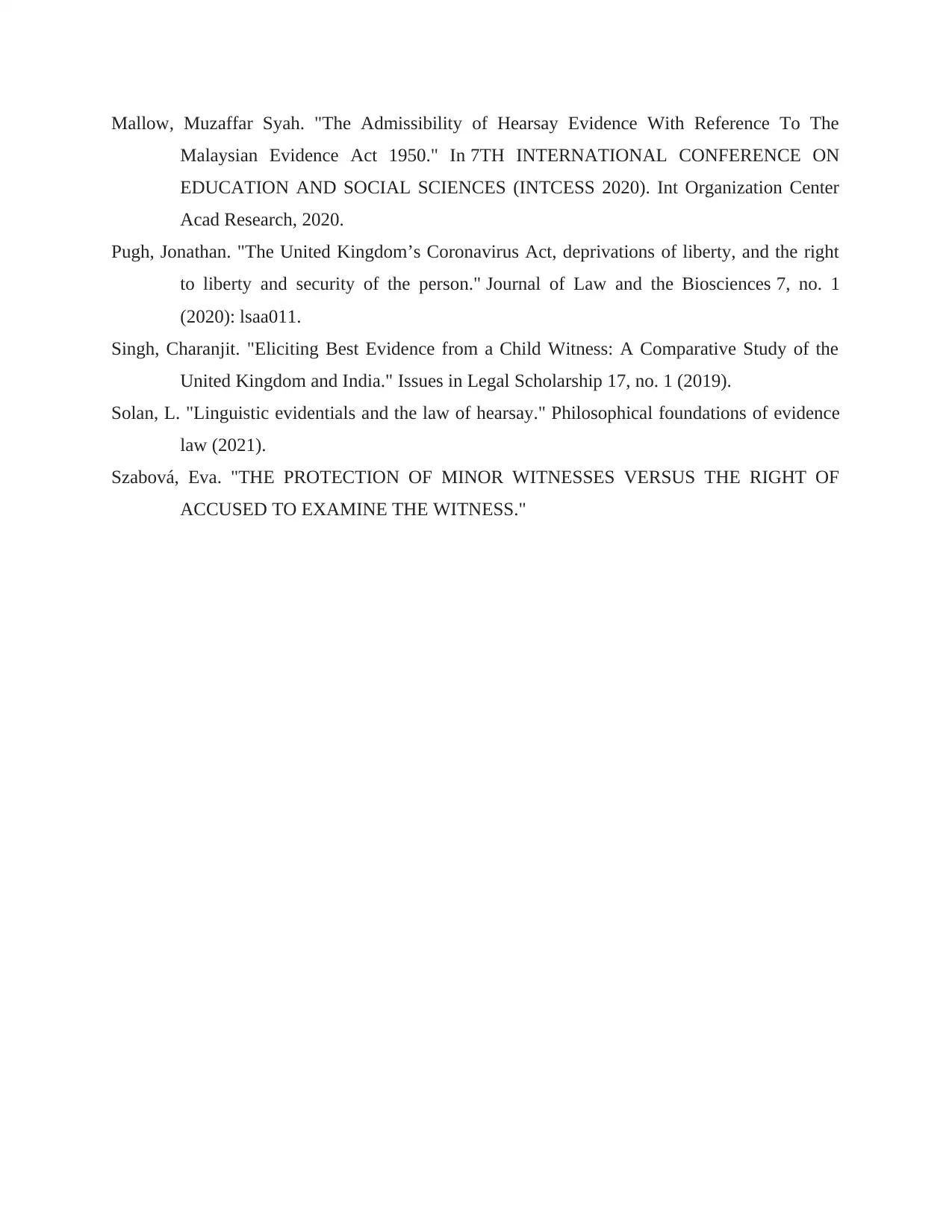
Mallow, Muzaffar Syah. "The Admissibility of Hearsay Evidence With Reference To The
Malaysian Evidence Act 1950." In 7TH INTERNATIONAL CONFERENCE ON
EDUCATION AND SOCIAL SCIENCES (INTCESS 2020). Int Organization Center
Acad Research, 2020.
Pugh, Jonathan. "The United Kingdom’s Coronavirus Act, deprivations of liberty, and the right
to liberty and security of the person." Journal of Law and the Biosciences 7, no. 1
(2020): lsaa011.
Singh, Charanjit. "Eliciting Best Evidence from a Child Witness: A Comparative Study of the
United Kingdom and India." Issues in Legal Scholarship 17, no. 1 (2019).
Solan, L. "Linguistic evidentials and the law of hearsay." Philosophical foundations of evidence
law (2021).
Szabová, Eva. "THE PROTECTION OF MINOR WITNESSES VERSUS THE RIGHT OF
ACCUSED TO EXAMINE THE WITNESS."
Malaysian Evidence Act 1950." In 7TH INTERNATIONAL CONFERENCE ON
EDUCATION AND SOCIAL SCIENCES (INTCESS 2020). Int Organization Center
Acad Research, 2020.
Pugh, Jonathan. "The United Kingdom’s Coronavirus Act, deprivations of liberty, and the right
to liberty and security of the person." Journal of Law and the Biosciences 7, no. 1
(2020): lsaa011.
Singh, Charanjit. "Eliciting Best Evidence from a Child Witness: A Comparative Study of the
United Kingdom and India." Issues in Legal Scholarship 17, no. 1 (2019).
Solan, L. "Linguistic evidentials and the law of hearsay." Philosophical foundations of evidence
law (2021).
Szabová, Eva. "THE PROTECTION OF MINOR WITNESSES VERSUS THE RIGHT OF
ACCUSED TO EXAMINE THE WITNESS."
⊘ This is a preview!⊘
Do you want full access?
Subscribe today to unlock all pages.

Trusted by 1+ million students worldwide
1 out of 9
Related Documents
Your All-in-One AI-Powered Toolkit for Academic Success.
+13062052269
info@desklib.com
Available 24*7 on WhatsApp / Email
![[object Object]](/_next/static/media/star-bottom.7253800d.svg)
Unlock your academic potential
Copyright © 2020–2026 A2Z Services. All Rights Reserved. Developed and managed by ZUCOL.





